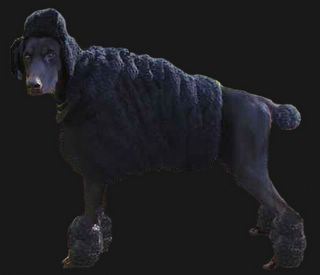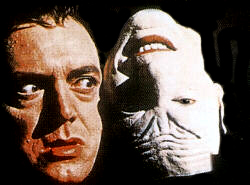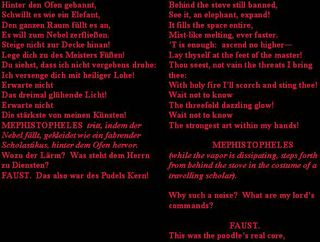Das also war des Pudels Kern!

The poodle was originally a German hunting dog, before the French got a hold of it...and, well, you can see for yourself how important cultural differences can be (not in this picture of course, as this is a Doberman in a poodle costume). "So that was the poodle’s core"...in German the genitive (possessive) noun comes second, or risks sounding poetic (as in 'Pudels Kern'). Sound backwards? If you’re learning German, get used to things sounding backwards. Colloquially the whole issue is typically ignored, and the word 'von' (of or from) is used instead.
In German you can be poodle-wet (pudelnass), poodle-naked (pudelnackt), poodle-clownish (pudelnärrisch), fit as a fiddle (pudelwohl), you can go away with your tail between your legs (abziehen wie ein begossener Pudel), throw a gutter-ball (einen Pudel werfen), or wear a knit cap (Pudelmütze)...but the most famous thing you can do (in a literary sense), is to identify something as having been the poodle’s core.

The original Doktor Faustus (Johann) was born in Roda, about 180 miles north of here. Legend has it he made a deal with the Devil (important to sign with your own blood, that way the contract doesn’t look casual or accidental), this included renouncing his Christian faith (natch)...and a 24 year expiration date. The day after his time was up the locals ventured into his room only to find "Bloodstains were everywhere. Bits of brain clung to the walls. Here they discovered an eye, and there a few teeth. Outside they found the corpse, its members still twitching, lying on a manure pile." Obviously the devil wasn’t just playing around.
I bought a copy of Goethe’s Faust and a DVD of an excellent 1960 film version starring Gustaf Gründgens, so I can watch the movie and follow along with the text. They certainly do not talk slowly, but it rhymes. This is supplemented by the English copy I bought for European lit thirty years ago (pretty sure I never read it, hated the teacher and he hated me).

Faust is out for a walk to shake off suicidal tendencies on Easter Sunday (symbolic), when he comes across a poodle (symbolic) outside the city gates (symbolic). The poodle follows him home and settles down behind the stove, only to turn into the devil. Notice the familiar form of "you see" in the text above (Du siehst), corresponding with the English (Thou seest). The 'du' form in German typically ends with 'st'...like the English hast, etc. What it signifies is simply an additional form of every damned verb, not to mention the unnecessary social intricacies created by having both a formal and a familiar form. People are dispensing with the formal more and more these days, but in general the Germans still want you to command their respect. Extraneous aspects of the German language are dropping like flies, but not fast enough to do me much good unfortunately.

<< Home